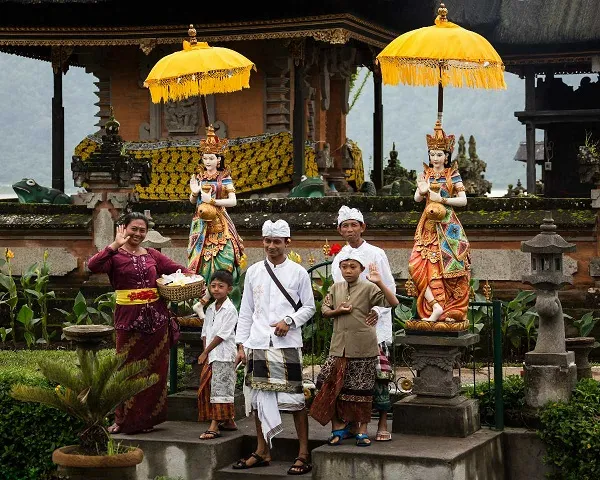Indonesian Culture: 12 Things to Know as an Expat

While you stay here, there are 12 things about Indonesian culture that you need to know as an expat.
Indonesia, a vast and diverse archipelago in Southeast Asia, is a country rich in culture, traditions, and natural beauty. For expatriates relocating to Indonesia, understanding the local culture is essential to adapt, connect with the locals, and fully enjoy your experience in this enchanting nation.
12 Things to Know About Indonesian Culture as an Expat
In this exploration of Indonesian culture, we will delve into various aspects, customs, and practices that expats should know to navigate and appreciate this diverse and vibrant society.
ALSO READ: 15 Tips on How to Save Money While Living in Indonesia as an Expat
1. Indonesian culture: Diversity of cultures and languages

Indonesia is known for its incredible cultural diversity. Comprising more than 17.000 islands, the country is home to over 300 ethnic groups, each with its own unique culture, language, and traditions.
Bahasa Indonesia, the official language, serves as a lingua franca, but many Indonesians also speak their regional languages. As an expat, it’s helpful to learn some basic bahasa Indonesia phrases, but English is widely spoken in urban areas, making communication more accessible.
2. The importance of religion
Religion holds a central place in Indonesian culture. The majority of Indonesians are Muslims, but there are also significant populations of Christians, Hindus, Buddhists, and others. Respect for religious customs and practices is crucial.
During Ramadan, the Islamic holy month of fasting, it’s important to be mindful of local customs, such as refraining from eating, drinking, or smoking in public during daylight hours. Similarly, when visiting temples or religious sites, dress modestly and follow the rules and rituals.
3. Warm hospitality and respect
Indonesians are known for their warmth and hospitality. As an expat, you’ll likely experience the graciousness of the locals who are eager to welcome and assist you. It’s customary to greet people with a smile and a handshake.
Using both hands to give or receive something is a sign of respect. Additionally, addressing people with their proper titles, such as Bapak (Mr.), Ibu (Mrs.), or Saudara/Saudari (Mr./Ms.), is appreciated.
4. Indonesian culture: Traditional arts and crafts
Indonesia boasts a rich tradition of arts and crafts, including batik, wayang kulit (shadow puppetry), wood carving, and traditional dance. Exploring and appreciating these art forms can provide insight into the cultural heritage of the country. You may want to attend a wayang kulit performance or visit a local art gallery to experience the beauty of Indonesian creativity.
5. Culinary delights
Indonesian cuisine is diverse and delicious. Each region offers its own specialties, from rendang in Padang to nasi goreng in Jakarta. Don’t miss the opportunity to sample street food, such as satay, soto, or nasi Padang. Be prepared for some dishes to be quite spicy, and don’t hesitate to ask for a milder version if you’re not used to the heat. Indonesians appreciate it when foreigners try their local dishes.
ALSO READ: Exploring Jakarta’s Cultural Treasures: 10 Must-Visit Museums While You’re in Town
6. Indonesian culture: Festivals and celebrations

Throughout the year, Indonesia hosts a plethora of festivals and celebrations that reflect the country’s cultural diversity. Eid al-Fitr, celebrating the end of Ramadan, is a major Muslim festival. Nyepi, the Balinese New Year, is a day of silence and reflection.
Additionally, regional celebrations like the Toraja Funeral Ceremony in Sulawesi or the Balinese Galungan are unique cultural experiences. Participating in these events can provide you with a deeper understanding of Indonesian traditions.
7. Traffic and transportation
Indonesia’s traffic can be chaotic, especially in major cities like Jakarta. Traffic jams are common, so plan your daily commute accordingly. Motorbikes are a popular mode of transportation, and you’ll often see families of four or more riding together. Ride-sharing apps like Gojek and Grab are widely used for convenience and affordability.
8. Environmental awareness
Indonesia is home to some of the world’s most breathtaking natural wonders, including Bali’s beaches, Komodo Island, and the jungles of Borneo. It’s essential to be aware of environmental issues, such as deforestation and coral reef degradation.
Many conservation efforts are ongoing, and as an expat, you can contribute by respecting local wildlife and ecosystems and participating in sustainable practices.
9. Traditional clothing
Traditional clothing varies across Indonesia’s regions. The batik shirt is a common choice for formal occasions. In Bali, the traditional sarong is worn by both men and women. Participating in traditional attire during local ceremonies or celebrations can be a meaningful cultural experience.
10. Indonesian culture: Etiquette and social norms
Understanding Indonesian etiquette is crucial. When visiting someone’s home, it’s customary to bring a small gift or token of appreciation. Removing your shoes before entering a house is also a sign of respect. Additionally, public displays of affection should be kept to a minimum, as they are considered inappropriate.
ALSO READ: 15 Tips to Survive Traffic Jam in Jakarta
11. Community and family values
Family is at the core of Indonesian society. Respect for elders is highly valued, and family gatherings are frequent. If you’re invited to a family event, it’s considered polite to accept the invitation. Engaging with the local community and building relationships can enhance your expat experience.
12. Patience and flexibility
Indonesian culture is characterized by a laid-back attitude and a focus on harmony. As an expat, it’s essential to be patient and adaptable when navigating bureaucracy or facing unexpected delays. Embracing the local concept of “jam karet” (rubber time) can help you maintain a positive outlook.
MORE FROM RUKITA:
- 10 Things You Should Know About Car-Free Day in Jakarta
- 10 Things to Do in Surabaya: Exploring A City of Vibrant Attractions
- Pros and Cons of Living Alone vs with a Roommate | Things to Consider Before Sharing an Apartment!
In conclusion, Indonesia’s rich and diverse culture offers expatriates a unique and rewarding experience. Embracing the customs, traditions, and values of the country will not only help you integrate into Indonesian society but also enrich your life as you explore this captivating archipelago.
As you embark on your journey as an expat in Indonesia, remember that cultural sensitivity and an open mind will pave the way for meaningful connections and a deeper appreciation of this remarkable nation.
Want to find a comfortable, modern, and strategically located apartment to stay in? Rukita offers many kinds of apartments that you can rent to live a more comfortable life.
Don’t forget to download Rukita app via Google Play Store or App Store or visit www.Rukita.co. Follow Rukita’s Instagram account @rukita_indo, Twitter account @rukita_id, and TikTok account @rukita_id to get the most recent information and other interesting deals!
Bagikan artikel ini

